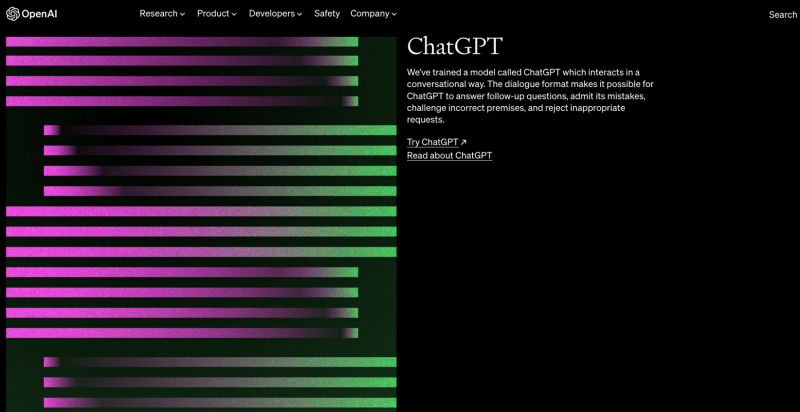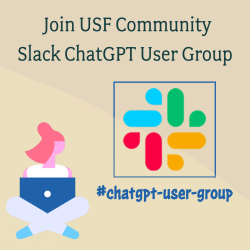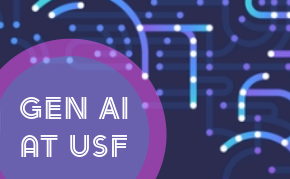Understanding ChatGPT at USF
What is ChatGPT?
ChatGPT is a chatbot developed by OpenAI in 2022. Based on artificial intelligence and large language models, ChatGPT can be trained to follow instructions in a prompt and provide a detailed response. It can be used to answer questions, perform different tasks, and generate content or code in a way that mimics human outputs. It has been quite controversial of its impact in academia in light of the integrity of students' works, thus we put together some resources to help you understand more about ChatGPT and to bring awareness of it as a tool in the future classroom.
- 2024 EDUCAUSE AI Landscape Study
- Webinar Harvard Business: What Happens to Learning When Generative AI Can See, Hear, and Speak (Professor Haya Ajjan, Professor, Management Information Systems, Associate Dean, Martha and Spencer Love School of Business, Elon University)
- Padlet Universities Policies on Generative AI: Collection of universities' policies and websites
- Webinar Harvard Business: Unlocking the Power of AI: How Tools Like ChatGPT Can Make Teaching Easier and More Effective (Dr. Ethan Mollick and Dr. Lilach Mollick, May 3, 2023)
- AI and the Future of Work: 5 Experts on What ChatGPT, DALL-E, and Other AI Tools Mean for Artists and Knowledge Workers
- AI in Higher Education: Research Hub
- Understanding AI Writing Tools and Their Uses for Teaching and Learning at UC Berkeley
- AI Text Generators and Teaching Writing: Starting Points for Inquiry
- Prepare students for future careers and the technology environment
- Students acquire analytical skills through the process of reviewing, examining, and critiquing generated responses
- Students develop critical thinking skills & digital literacy
- Students learn to create well-crafted prompts (“prompts engineering”) for the best results
- Educators can rethink the ways to design creative lesson plans and assignments
- Educators can consider assessments that focus on reflective learning, personal experience, collaborative work, and process.
- Ask ChatGPT a question, and evaluate how good the responses are. Learn to modify the prompt and examine the change in response.
- Ask students to act as editors and subject experts, and critique ChatGPT-generated content
- Ask students to create a bibliography fact-checking ChatGPT-generated work
- Enter a large lengthy text as the prompt, and ask ChatGPT to synthesize the long document into PowerPoint presentation slides with headers and bullet points.
- Use ChatGPT for translation in your language class, and have students discuss the room for improvements.
- Try to use ChatGPT to debug incorrect codes to help students as a personal tutor.
- Assign topics for students to debate with ChatGPT, and have students reflect on what they have learned.
- Ask students to do peer reviews on each other's work.
Sources:
UCLA The Use of Generative AI in Teaching and Education - Guidance to Instructors
Hypothes. is: "Leveraging Social Annotation in the Age of AI"
-
GPT-4.5 Has Passed The Turing Test. What Does That Mean For Teachers? (Tech&Learning, Erik Ofgang, June 1, 2025)
-
GPT 4o: What Educators Need to Know (Tech&Learning, Erik Ofgang, May 20, 2024)
-
Streamline with ChatGPT Plugins (Mary Howard, September 6, 2023)
- AI Detectors Discriminate Against Non-Native Speakers, Says Stanford Research (Tech&Learning, Erik Ofgang, November 7, 2023)
- Harvard Business Review: Generative AI Has an Intellectual Property Problem (Gil Appel, Juliana Neelbauer, David A. Schweidel, April 7, 2023)
- Reexamining "Fair Use" in the Age of AI (Stanford University HAI, Andrew Myers, June 5, 2023)
- Should You Add an AI Policy to Your Syllabus? What to consider in drafting your own course policy on students’ use of tools like ChatGPT. (The Chronicle of Higher Education, Kevin Gannon, July 31, 2023)
- Department of Education’s Office of Educational Technology (OET) Report: Artificial Intelligence (AI) and the Future of Teaching and Learning: Insights and Recommendations (June 1, 2023)
- How ChatGPT Bested Me and Worsted My Students (Brandi Lawless, associate professor and chair of the Department of Communication Studies, University of San Francisco, April 20, 2023)
- Generative AI Golden Engagement Guide (Innovative Educators)
- Playlist: ChatGPT in Higher Education - A New Frontier (Alchemy)
- Padlet: ChatGPT/AI Use Cases & Strategies in Higher Education (Curated y Dr. Heather M. Brown)
- UCLA The Use of Generative AI in Teaching and Education - Guidance to Instructors
- GenAI Chatbot Prompt Library for Educators (AI for Education)
- ChatGPT Prompt eBook (Monica Burns, Class Tech Tips)
- A resources hub: Leverage AI for quality education (FeedbackFruits.com)
- How to cite generative AI in MLA style
- APA Citation Guide (APA 7th edition) AI-generated text and image


